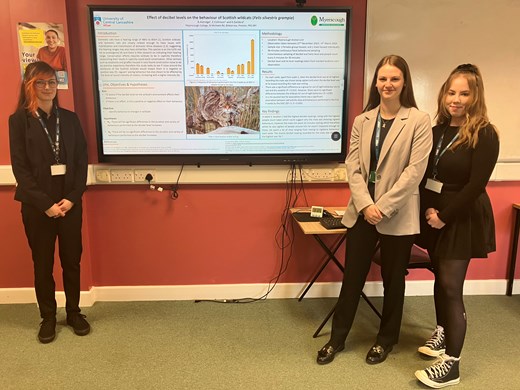Course modules
Year 1
Animal Bioscience
To address the fundamental aspects of animal bioscience including metabolism, genetics, nutrition, behaviour, care, health, and the social and environmental impact of domestic animals
Applied Animal Behaviour and Welfare Science
To examine and evaluate current stress indicators of welfare, including behavioural attributes and physiological parameters.
Comparative Animal Physiology
To explain the concept and importance of maintaining physiological homeostasis at, molecular, cellular and tissue and body system levels
Year 2
Current Issues and Innovation in the Animal Industry
A quest for solutions for complex issues currently impacting on animal welfare and the animal industry, incorporating consideration of cross-discipline techniques and approaches.
Evidence Based Animal Husbandry
Application of evidence based research to include aquariums, research facilities and zoological collections will allow students to develop a broad knowledge-based approach to solving specific problems and for suggesting management.
Research Methodology and Design
This module provides students with the essential personal, organisational, management, theoretical and statistical skills needed to work at Postgraduate Level. It will explore research philosophies, research process and design and the process of questionnaire development and design. The module will develop skills in advanced data organisation, presentation, dissemination and problem solving.
Year 3
Masters Dissertation
The dissertation is a triple module and allows students to design and conduct a substantial piece of independent, supervised research in the field of equine science. The dissertation is an independent piece of academic work which allows the student to identify and work in an area of interest to them and manage the research process to agreed deadlines.
Entry requirements & additional information
- Entry requirements
- Learning and assessment
- Progression
- Careers
- Professional accreditations
- Learning support
- Special requirements
Entry requirements
Applications are sought from individuals possessing a minimum of Lower Second Class (2.2) Honours Degree (or equivalent) in a related discipline.
Candidates not possessing an Honours Degree at the above grade but with relevant professional qualifications and experience will be welcomed. All non-standard applicants may be interviewed to assess suitability for the course.
Career experience plus evidence of study skills may also be considered. Consideration will be given to non-traditional qualifications and relevant work experience. Applicants are encouraged to produce evidence of their potential to benefit from the course. Applicants who believe they may be eligible for Accreditation of Prior Experience/Learning (APE/L) for certain modules will be considered on an individual basis.
Applicants whose first language is not English will be required to have an English qualification to IELTS 6.5 or equivalent.
All offers may be subject to successful interview.
Learning and assessment
Learning Environment:
This course will utilise the new animal centre on site to include the dairy, beef and sheep units off site and equine facilities where appropriate. Students will also have access to specialist IT hardware and software as well as to Myerscough's virtual learning environment. Learning activities on the course are diverse, including lectures, seminars, tutorials, workshops and practical sessions. Students will be expected to undertake extensive independent study and research to support lectures, seminars and assessments.
Assessment:
Students will face a variety of assessments, including written reports, essays, literature reviews, examinations, dissertation, research proposal and presentations.
Other Opportunities
Students are encouraged and supported to submit their research to relevant journals or conferences, subject to the successful application for scholarship funding or self-funding.
Progression
On successful completion of the course, students may apply for PhD.
Careers
Graduates will be in a position to apply for posts in the animal and related industries with examples of possible careers including:
Training assistance dogs
Welfare inspectors
Zoological education/research/keeping
Research and development
Local authority/Defra/HM customs animal welfare officers
Pet behaviour advisors
Professional accreditations
All students are encouraged to pursue membership of the Association for the Study of Animal Behaviour (ASAB) and British Society of Animal Science (BSAS) as well as pursuing scholarships and travel awards with other professional animal organisations.
Learning support
You can contact the College Inclusive Learning team or UCLan Student Services (or let one of the course team know that you have a disability or an issue related to your disability). With your agreement information will be passed on to the relevant service
Special requirements
Extra Costs
Additional costs for items that are essential for the course include:
· Black warehouse coat, £12
· Black combat style trousers £15
· Laboratory Coat - £15
· Strong Boots or Wellingtons and waterproof trousers - £50
Additional costs for opportunities and items that are optional for the course include:
· Binoculars £30
· Field Trips and Visits – optional S Africa £3,500
Latest news, Animal studies
-
Unforgettable South Africa experiences for animal studies students
- Published
- Thursday 29 Aug 2024
-
Animal studies tutor to attempt famous gruelling fell challenge for local hospice
- Published
- Monday 13 May 2024
-
Degree students present research at national conference
- Published
- Friday 10 May 2024
-
Myerscough continues to evolve ‘Hedgehog Friendly Campus’ status
- Published
- Thursday 9 May 2024
-
Degree students share their research projects at Graduate Showcase
- Published
- Friday 26 Apr 2024
Research
University Centre Myerscough is proud of its commitment to original research. We believe that our teaching and learning, particularly at higher education level, should be underpinned by strong scholarly activities; the pinnacle of which is the Centre's pioneering research programme.
University Centre Myerscough has more than 30 lecturing staff actively engaged in research projects, often working alongside teams of undergraduate and postgraduate students. Relevant research helps to maintain the University Centre Myerscough's position at the forefront of the industries it serves, whilst also adding value and diversity to our curriculum content and styles of teaching.

We host a popular annual research conference (open to students) to highlight our work. Much of this work is undertaken in collaboration with other Higher Education Institutions including the University of Central Lancashire, Lancaster University, The University of Manchester, Anglia Ruskin University and The University of Liverpool.
Our recent Research publications include the following: UCM Research Publications

